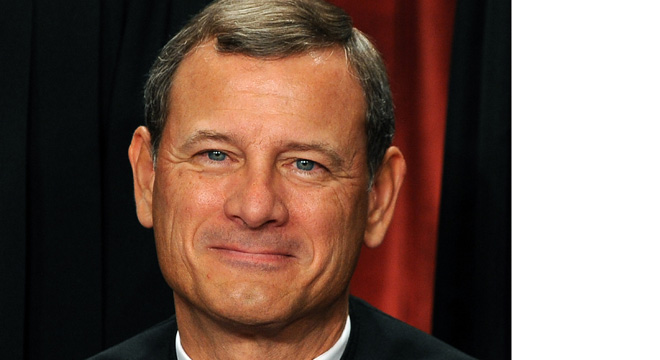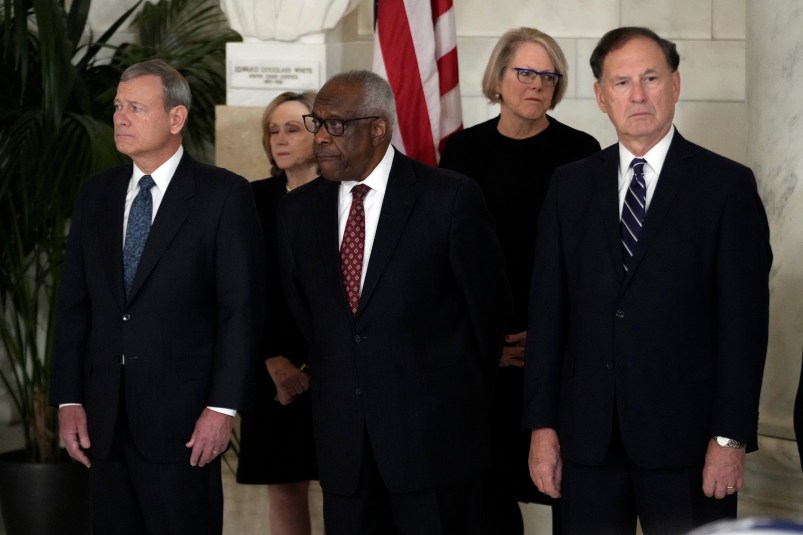You may have noticed that a strange telepathy pandemic has swept DC since the Supreme Court upheld the ACA. Its most potent vector is this CBS report that John Roberts changed his mind weeks into the deliberations and decided to join the liberal wing of the Court. Now everyone pretends to know why Roberts did what he did.
At the very least, we now know pretty conclusively that a couple people in the Court (clerks? Justices?) believe Roberts flipped, and are pretty upset about it. But let’s stick for now with the interpretation everyone else deems conclusive and say that Roberts had a change of heart.
The widely shared assumption now is that Roberts caved to politics — to public criticism of his Court in advance of the ruling. Conservatives have an obvious investment in that conclusion — they’re unhappy about the outcome, and if Roberts really bowed to external political forces, then it undermines the legitimacy of the Court’s opinion.
But it’s pretty outlandish for anybody without a vested interest in reading things that way to buy into same argument on the basis of what amounts to mind-reading. It’s just as plausible that Roberts flipped after belatedly recognizing that his original instincts had been political. Who knows? As I said, this is mostly mind-reading. But there’s at least one data point in favor of a more generous read. Here’s how CBS played it, based on interviews with people better positioned to read John Roberts’ mind than we are.
Some informed observers outside the court flatly reject the idea that Roberts buckled to liberal pressure, or was stared down by the president. They instead believe that Roberts realized the historical consequences of a ruling striking down the landmark health care law. There was no doctrinal background for the Court to fall back on – nothing in prior Supreme Court cases – to say the individual mandate crossed a constitutional line.
The case raised entirely new issues of power. Never before had Congress tried to force Americans to buy a private product; as a result, never before had the court ruled Congress lacked that power. It was completely uncharted waters.
To strike down the mandate as exceeding the Commerce Clause, the court would have to craft a new theory, which could have opened it up to criticism that it reached out to declare the president’ health care law unconstitutional.
Roberts was willing to draw that line, but in a way that decided future cases, and not the massive health care case.
The idea is that perhaps Roberts wanted to knife the ACA, but decided against it — not because of anything he read in the New York Times, but because he realized he couldn’t find a defensible argument rooted in precedent to do so.
This is also perfectly compatible with yet a third view that Roberts acted to preserve the Court’s public legitimacy — that he realized at some level that it was unwise for the Court, and perhaps even for the conservative judicial movement in general, to gut or void a major new law on the basis of a case about novel questions of federal power.
Being generous to Roberts is inconvenient if you want the world to believe that he acted in dereliction of his oath. But it fits the facts as far as we know them at least as well as anything else. And remember, it’s clear that Roberts didn’t just fabricate an entirely new opinion in May. He hinted at it way back in March.
All of which is to say I think it’s worth everybody taking a deep breath and admitting there’s just a ton we don’t know. High level speculation can be a lot of fun. But in this case, where some on the right are already calling for a Congressional inquiry into the politicization of the ACA decision, it could easily get out of hand.







